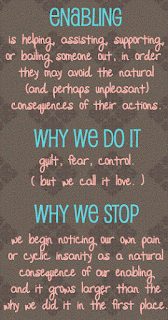ARE YOU AN ENABLER?
Home Enabling: Are You An Enabler?
Are You An Enabler?
#DRUGREHAB #ADDICTS, #FRIENDS AND #FAMILY OF ADDICTS, #PARENTS, #WOMEN
Behind many addicts you’ll find enablers. An enabler can be a parent, a spouse or even a child, and usually her intentions are good. The problem is that loving an addict, supporting him and empowering him can often turn into enabling. When you enable the addict in your life you are only making the problem worse and preventing him from getting the help he really needs. So how do you know if you are helping or hurting?
What Is Enabling?
Enabling means taking away or covering up the consequences of your loved one’s addiction. Consequences are powerful motivators. When an addict destroys his relationships, loses his job or spends all his money on drugs he is forced to face the truth about his problem with drugs or alcohol. If you take actions to shield him from these consequences, he need not face the truth and he will likely keep doing what he is doing. You are enabling him.
Put this way it sounds pretty straightforward. When you’re in the thick of it, though, it can be tough to know if you are enabling your addict or helping him. You should help your loved one. You should empower him to get help for himself. Helping an addict doesn’t always mean tough love, but there can be a fine line between caring and enabling.
Signs You Are An Enabler
Here are some surefire signs that you are an enabler:
You make excuses or lie – You cover up or gloss over bad things that your loved one is doing and make excuses to other people. For instance, you might explain away his embarrassing bender at a party by telling everyone that he was sick and the alcohol interacted badly with his cold medicine.
You take on his responsibilities – For an addict, everyday responsibilities are usually the first thing to go south. If you pick up the slack by picking up the kids from school, doing his chores, taking care of his aging mother or anything else he is supposed to do, you are not letting him feel the consequences of his neglect.
You put the blame for his problems on anyone but him – Addicts are great at assigning blame to third parties. It’s part of denial. You may add to the problem by encouraging this or telling him that he’s right. You may even blame yourself. The truth is that he makes his own decisions and he needs to realize that.
You take care of him financially – Addiction costs money. Do you give him more money when he runs out? Do you pay the bills or legal fees? Helping him financially may seem unconnected to his addiction, but it isn’t.
You avoid addressing the problem out of fear – If you are afraid to face the problem of your loved one’s addiction because you are afraid of a fight or that he will leave you, you are enabling.
How To Stop Enabling And Start Helping
If you recognize the enabler in your habits, it’s time to stop. Start with a conversation about the problem. Stop ignoring it. Tell your loved ones that things will change from now on. You will no longer take care of his responsibilities. You will no longer give him money. What you will do is support and love him. Offer to be there as he gets help or goes to rehab. Tell him and show him that you are there to help and support, but that he needs to get help. Once he starts to really feel the consequences of his addiction he will start to realize the extent of his problem.
If you or a loved one needs help with an addiction, contact us at 1-800-513-5423 today http://drugrehabservices.com/
Reference link

